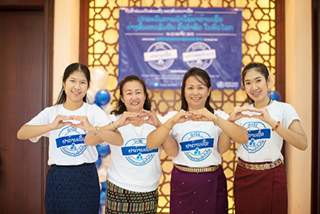WHO launched the first global Antibiotic Awareness Week (AAW) campaign from 16th to 22nd November; countries around the world held activities to raise awareness of global antibiotic resistance and to promote the responsible use of antibiotics. The theme for this year’s AAW is "Antibiotics: Handle with Care".
The awareness campaign focused on health workers, medical professionals, pharmacists and medical and nursing students from the University of Health Sciences to understand the challenges of antimicrobial resistance and to commit to use antibiotics responsibly, prescribing what is need, to ensure that patients use the full course of antibiotic and never share or use leftover antibiotics.
Pledge signing at Mahosot Hospital, 10 November
Activities for the AAW began a week earlier on 10 November, with the pledge signing event launched by Assoc.Prof. Dr. Chanphomma Vongsamphanh, Director of Department of Health Care, Ministry of Health. WHO engaged with medical professionals working in hospital settings; to discuss the role they played in advocating for the responsible use of antibiotics.
Staff from six additional central hospitals was also informed about the purpose of AAW, with a pledge signing wall installed in the main lobby area of each hospital. Medical staff was encouraged to make a personal commitment and public pledge to promote responsible antibiotic use.
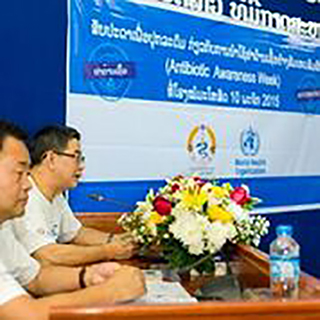
Speaking at the event, Dr Luo Dapeng, WHO Medical Officer advised the health professionals about the problem of antimicrobial resistance that is occurring everywhere. “It is a multi-dimensional health threat that goes beyond public health; it compromises our ability to treat infectious diseases, and undermines advances made in health and medicine, ranging from new multidrug resistance observed in TB cases, malaria, gonorrhoea and hospital-acquired infections caused by ’superbugs’”.
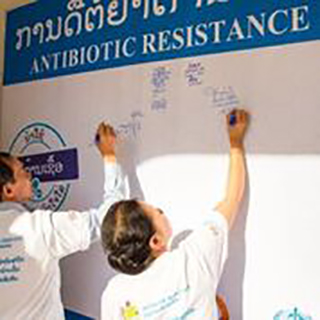
Role of healthcare providers
Healthcare providers have a responsibility to patients who are seeking medical care to protect them from acquiring infections as a result of medical decisions and interventions and for providing the correct treatment. Healthcare-associated infections are one of the primary causes of death and suffering in hospitalized patients throughout the world, so infection prevention and control is considered to be a cornerstone of patient safety.
Poor infection prevention and control allow the emergence of drug resistance and spread of drug-resistant infections. Hospitalized patients are one of the main reservoirs of resistant microorganisms. Patients who are carriers of resistant microorganisms can act as a source of infection for others.
Healthcare workers can prevent infections by ensuring hands, instruments and the environment stays clean. When a bacterial infection is suspected it is important to perform bacterial cultures and antibiotic susceptibility testing to confirm the correct treatment. At the same time, it is important to prescribe and dispense antibiotics only when they are truly needed; ensuring the right dose for the right duration is also vital.
Antibiotic Awareness Week Launch at the National Cultural Hall on 17th-18th November
The event at the National Cultural Hall was launched by Assoc. Prof. Dr. Bounnack Saysanasongkham, Deputy Director of Department of Health Care, Ministry of Health. Presentations and panel discussion on the multi-sectoral problem of antimicrobial resistance was discussed by experts from the Ministry of Health and the Ministry of Agriculture, Forestry and Fisheries.
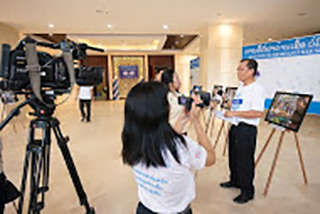
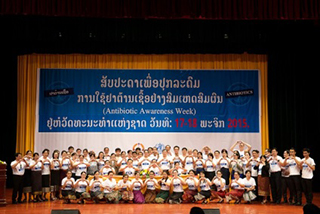
A combination of misuse and overuse of antibiotics in agriculture and human health care has led to the problem of antimicrobial resistance and permitted resistant bacteria to thrive. In addition, the local, national and international spread of resistant bacteria between individuals and communities has led to a world where we are all at risk of infection with untreatable infections.
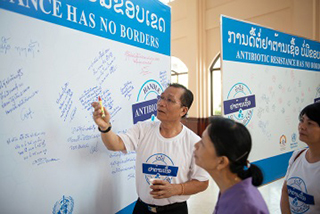
Dr Bounnack explained to participants that factors contributing to the emergence and spread of antimicrobial resistance in Laos included cheap, affordable antibiotics and the widespread availability of many substandard products in the market. There is a need to enforce regulations to ensure that antibiotics can only be dispensed by a licensed prescriber. The failure to stop over-the-counter sale can be detrimental. In addition, he recognized the importance of educating physicians, nurses, pharmacists and medical students on the importance of appropriate use of antibiotics.
University of Health Sciences debate on AMR
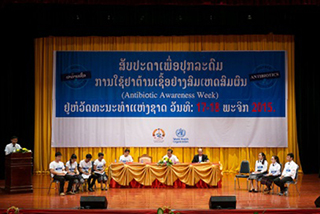

The need to act NOW
Dr Bounnack said “It is vital for the health sector to act now, together with other line ministries and policymakers, we need to develop a comprehensive strategy that will addressed the threat of antimicrobial resistance; aim to decrease the transmission of resistant organisms — in homes, communities, healthcare settings, food chain, water supplies, and international trade routes through improved hygiene and responsible use of antibiotics.”
Everyone has a role to play when it comes to handling antibiotics with care.
